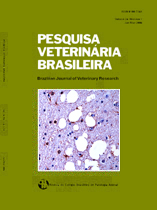 |
|
|
|
Year 2013 - Volume 33, Number 11
|

|
Immunohistochemical characterization of bovine brain lesions caused by Senecio sp. ingestion, 33(11):1325-1331
|
ABSTRACT.- Wouters A.T.B., Boabaid F.M., Fredo, G., Wouters F. & Driemeier D. 2013. [Immunohistochemical characterization of bovine brain lesions caused by Senecio sp. ingestion.] Caracterização imuno-histoquímica das alterações encefálicas em bovinos com hepatopatia tóxica causada por Senecio sp. Pesquisa Veterinária Brasileira 33(11):1325-1331. Setor de Patologia Veterinária, Faculdade de Veterinária, Universidade Federal do Rio Grande do Sul, Av. Bento Gonçalves 9090, Bairro Agronomia, Porto Alegre, RS 91540-000, Brazil. E-mail: angelicawouters@yahoo.com.br
Senecio spp. poisoning is an important cause of illness and death of cattle in Rio Grande do Sul, Brazil, and is often manifested by neurologic clinical signs and histological brain changes. Histological evaluation was performed on liver and brain samples of ten cattle naturally poisoned by Senecio sp. Samples of cerebrum, brainstem and cerebellum were stained with periodic acid-Schiff (PAS), and immunohistochemistry was carried out, employing anti-fibrillary acidic protein (GFAP), anti-S100 protein and anti-vimentin antibodies. The histological finding in the brain included mild to severe vacuolation in the white matter and the junction of gray and white matter, characterized as spongy degeneration. Histochemical and immunohistochemical staining revealed no significant findings compared with the brains of eleven adult cattle without liver and/or brain changes used as controls. |
| |
|
|
| |
|
 |